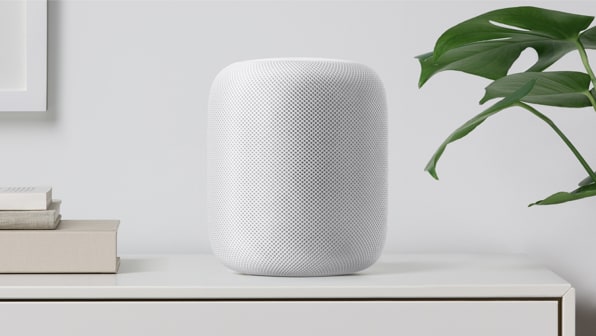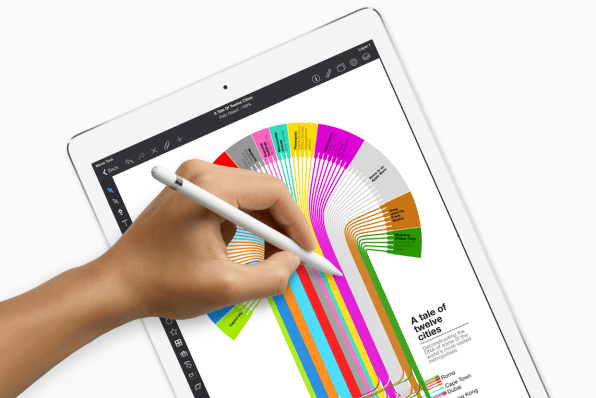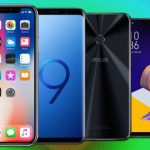WWDC 2017: Here’s Everything Apple Announced
At Apple’s Worldwide Developer Conference keynote on Monday, the company unleashed a two-hour storm of announcements, including both new hardware and software feature upgrades. The developer event usually focuses on software–operating systems and apps–but included a surprising amount of hardware this year.
To get you in the mood, check out this snappy video Apple showed at the beginning of the keynote, then we’ll segue into the OS upgrades that will arrive this fall:
Introducing iOS 11
New iOS 11 features dominated the presentation:
Photos. To save memory while preserving quality, Photos will store images and videos using compression standards called HEIC and HEVC, respectively. The Memories feature, which uses AI to form custom presentations of photos and videos, can more quickly scan the library to identify things like events and people, Apple said. Memories is smart enough to curate highlights of your camera roll optimized for both portrait and display modes.
Apple Pay. Apple added person-to-person payments via Apple Pay inside Messages. You can send money in the body of a message, and authenticate the transaction using Touch ID. Messages will also get the ability to sync all messages from all the user’s devices in the cloud.
Siri. As expected, Siri will get some new smarts. Most importantly, it’ll become more aware of the user and more proactive about delivering assistance. On-device machine learning will do things such as let Siri suggest news stories to read or help you make a calendar appointment based on a booking you made in Safari.
In iOS 11, Siri will translate English to Chinese, French, and Italian, with more languages coming. It will also get some new male and female voices that Apple says are “more expressive.”
In addition, Siri will offer improved support for third-party apps, letting you use it to perform tasks such as taking notes in Evernote and bring up QR codes in WeChat.
Music. Apple announced MusicKit, an API that lets developers integrate their services more tightly with Apple Music.
App Store. The iOS App Store is getting a sweeping redesign, Apple says. A new Today tap will offer information and videos for featured apps. A Games tab will feature new releases, gameplay videos, stats on popular games, and information about new in-app purchases in games.
Maps. Apple unveiled some new iOS 11 mapping features, including indoor maps of malls and airports, info on speed limits, and assistance on which lane you should be in during navigation. Also new for motorists: a new “Do Not Disturb While Driving” mode that figures out when you’re in a moving car and turns off notifications.
HomeKit. Users in households with HomeKit-friendly gadgets will be able to configure and control their speakers in the Home app, building multi-room audio environments and using AirPlay 2 for the connection.
New for WatchOS 4
Apple announced new features in the next OS for Apple Watch, watchOS 4. The coolest among them was a new AI-driven Siri watch face that automatically suggests content you might need. Whenever you shake your wrist, the watch face will update with new, updated information on items such as travel times or flight times.

It’s called MacOS High Sierra
Some thought Apple might name the new OS “macOS 11” to sync up with the iOS 11 name. Nope. Instead, it’s doubling down on the California landmarks theme with “High Sierra,” a name which indicates that it’s a refined version of last year’s Sierra rather than something radically new. The latest version, Apple says, is far faster than its predecessor. It also features an improved Safari browser that blocks auto-play video in web pages (yeah!) and prevents web sites from tracking users as they move around the web. And Apple is working with 3D platforms Unreal and Unity to let those tools create VR content on a Mac–demoed onstage with a look at ILM Star Wars VR built in Unreal.
At Last, Amazon On Apple TV
There was very little news on the Apple TV’s tvOS software, but what there was mattered. Apple announced that the Amazon Prime Video app is coming to Apple TV later this year. The service has hundreds of movies and TV shows, and original content like Transparent and Man in the High Castle.
Hardware Aplenty
Apple’s developer event is usually reserved for the operating systems, but hardware played a key role today:

A Speaker Called HomePod
After months of speculation, Apple announced a new smart speaker–the HomePod–to compete with Amazon Echo and Google Home. Packing a large woofer and seven tweeters, it streams music from Apple’s Music service, suggests music based on its knowledge of user tastes, delivers news and information on demand, and can be used to control connected home devices like lights, plugs, and thermostats. HomePod will sell for $349 and is scheduled to ship in December.
My colleague Harry McCracken just had a listen to the new device, and liked what he heard.
An iMac for the Pros
The iMac line got an update. The 21.5-inch, 21.5-inch Retina 4K, and 27-inch machines all moved to Intel’s Kaby Lake processors. Each gets a bump in graphics power, too.
Apple also announced a new $5,000 iMac Pro (in gunmetal gray) designed with the high-end specs that creative professionals–a group often concerned that the company is forgetting about them–need to do things like develop VR games. Check out the video:

Love For The iPad
For months now, scuttlebutt has had it that Apple would announce an iPad Pro with a 10.5-inch screen that offered more screen real estate than the iconic 9.7-inch model but more portable than the 12.9-inch iPad Pro. The company announced that machine, along with a revised 12.9-inch model which–like the 9.7-incher–offers improved screen technologies and upgrades to its cameras.
To sweeten the deal, Apple announced a bevy of new iOS 11 features designed for the iPad. New drag-and-drop features let users move images, links, and other items between two apps—even two apps running separately in full-screen mode. A new Files app will make the iPad seem more like a work machine than a content consumption device. It can also be used to work with files on third-party services like Dropbox and Box.
Apple Edges Into Augmented Reality
Perhaps the most surprising announcement of the day was Apple’s quick leap into the AR space. The company announced a new development tool called ARKit that will let developers create AR experience for the iPhone or iPad. The technology uses the phone’s sensors to detect things like depth of field, ambient light, and motion sensors. This information is needed to place digital items within the scene in a natural-looking way.
In just a bit over two hours, Apple packed even more news than usual. With some of the stuff it unveiled not shipping until late this year, it’ll take a while to gauge all of its significance. But overall, the company made a strong case that it’s keeping up with rivals Google, Amazon, Facebook, and Microsoft in the contest of the tech platforms.
Apple’s event was packed with new software and hardware, from operating-system upgrades to the HomePod smart speaker to the 10.5-inch iPad Pro to a phalanx of new Macs.
At Apple’s Worldwide Developer Conference keynote on Monday, the company unleashed a two-hour storm of announcements, including both new hardware and software feature upgrades. The developer event usually focuses on software–operating systems and apps–but included a surprising amount of hardware this year.
Fast Company , Read Full Story
(49)














